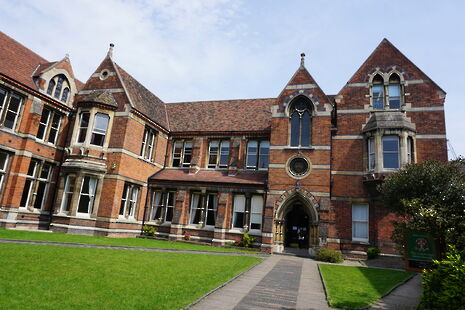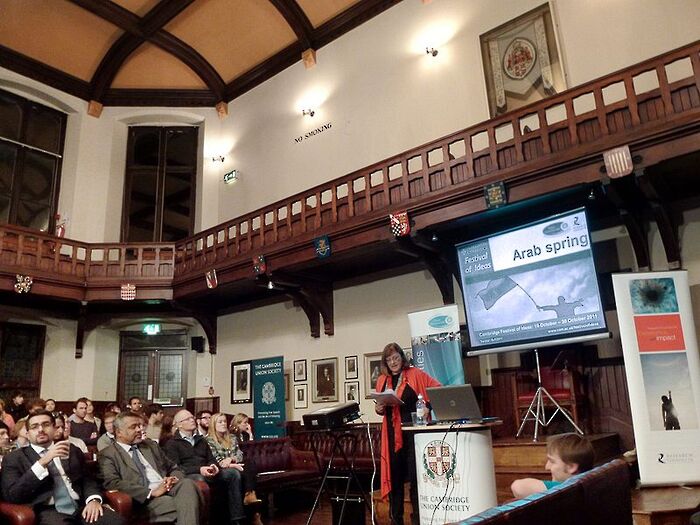The Union should realise that more celebrities doesn’t equal accessibility
Although there’s been some progress, simply thrusting reality TV stars into arcane parliamentary debates is a poor way of making the Union more accessible.

In an effort to increase accessibility and continue to provide a continually fresh menu of entertainment, this academic year sees an impressive troupe of ex-state leaders, MPs, royals and Supreme Court members debating and speaking at the Cambridge Union. There's an injection of “celebrity”, too: stars of Made in Chelsea and Love Island abound, and the term card even features a former member of the Kardashian clan.
On their website, the Union boasts of “defending free debate since 1815”, and I would be inclined to concede that this is accurate. Given that the Union is far from free in a monetary sense (though the entrance price has been reduced), it’s clear that this slogan refers to the ‘free speech’ which can be found echoing ethereally inside its chambers on an almost daily basis. The Union is indeed liberal with who debates and what is debated. For example, when Katie Hopkins came to speak at the Union, the president at the time wrote an article defending the decision to invite her despite her incendiary views. But it’s the debate itself that I’m concerned for.
"Installing underprepared public figures in a debate to draw people in with “celebrity” is not a particularly promising way to change the image of debating in Cambridge"
Of course, diversifying the range of speakers that come to the Union can only be praised. More female speakers, speakers who are closer to our age, that aren’t white, that aren’t cis, and speakers that didn’t go to Oxbridge will definitely make the Union more accessible. Georgia Toffolo, a young female entrepreneur and a star of Made in Chelsea, who spoke last term, is obviously going to inspire and engage different people to Boris Becker, in addition to challenging perspectives in a way successful old white men, in general, cannot.
Problems arise, however, when the Union thrusts these figures into parliamentary-style debates. Doing so only serves to highlight the inherent, time-honoured inaccessibility of these characteristically formal events. I was the first person into the Union debating chamber when they announced a debate between the stars of Love Island and Made in Chelsea and Cambridge contestants from University Challenge, but quickly found the format was totally unsuited to the participants.
The speeches of the reality TV stars quickly descended into Q&A sessions which disclosed little more than the reassurance that there were pros and cons to being a reality TV star, but that overall the celebs were glad to be rich and successful. With little to debate against, all four Cambridge students’ arguments centred – boringly – on their desire not to be on Love Island and have their identities become “public property”. They made the occasional concession that, if beautiful and hilarious and given the opportunity, they could not guarantee they would remain of this opinion.
Not only was this string of predictable jokes uninspiring, it was uncomfortable: it was obvious that the reality TV stars, having done the unthinkable and aired their most private of moments on live television in front of millions, were nervous in front of the relatively tiny number of Cambridge students in front of them. Likely this was because they realised that what they had to say, though relevant and interesting to many, would be compromised when presented as part of a parliamentary debate.
Installing underprepared public figures in a debate to draw people in with celebrity is not a particularly promising way to change the image of debating in Cambridge – an image defined by the hierarchical organisation of the Union (I often imagine the juicy House of Cards spin-off the Union could inspire), the black tie, and the membership fees. It also risks debasing the aspects of the Union that we should celebrate, like the quality debates it fosters on topical subjects between experts, which can be exceptionally entertaining and informative.
Entertainment is defined as something that can provide amusement but also simple enjoyment, and that does not necessarily require a laugh a minute. A good debate should be an intricate dance of rebuttals, burdens and ‘points of information’, and speakers should be able to engage and persuade their audience without feeling obliged to intersperse their speeches with trite jokes so that they ‘entertain’.
Happily, the Union seems to have anticipated my foreboding with the Union+ initiative, which will put on events other than speakers and debates, such as panels and workshops. These will be available to all members of the University, and therefore truly free in every sense of the word. New voices and new perspectives need new spaces. Hopefully the initiative will fulfil its potential as such a space, and the Union will continue to arrange world-class debates between well-prepared and passionate minds
 News / News in Brief: Postgrad accom, prestigious prizes, and public support for policies11 January 2026
News / News in Brief: Postgrad accom, prestigious prizes, and public support for policies11 January 2026 Comment / Will the town and gown divide ever truly be resolved?12 January 2026
Comment / Will the town and gown divide ever truly be resolved?12 January 2026 Comment / Plastic pubs: the problem with Cambridge alehouses 5 January 2026
Comment / Plastic pubs: the problem with Cambridge alehouses 5 January 2026 Lifestyle / The only party girl in the East Midlands12 January 2026
Lifestyle / The only party girl in the East Midlands12 January 2026 Features / How sweet is the en-suite deal?13 January 2026
Features / How sweet is the en-suite deal?13 January 2026









